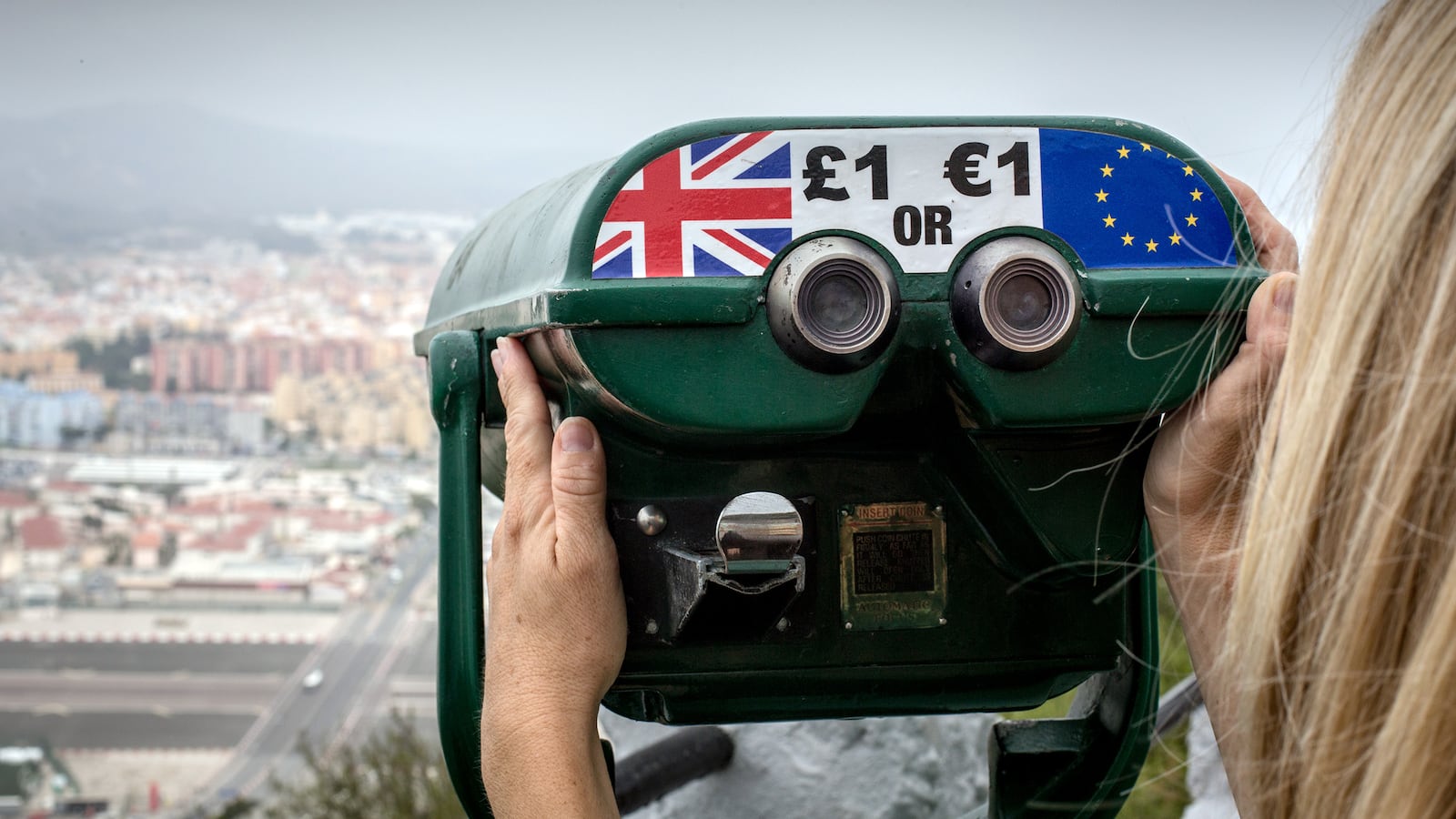If it weren’t for the flags, and perhaps the bored-looking woman waving me through from behind plexiglass, I’m not sure I would have been able to tell you at what point I left Spain behind me. The border between La Línea de la Concepción and the British Overseas Territory of Gibraltar is perhaps the easiest I’ve ever crossed, up there with Ireland’s border with the north and the one lying between San Diego and Tijuana It’s only coming back the other way that renders the latter a waking nightmare.
By the time I made it into town, however—a 15-minute walk across a Royal Air Force base—it was difficult not to know. One enters the city center through a tunnel, like Alice on her way to Wonderland, emerging into one of the strangest town squares in Europe: a Spanish plaza festooned with the Union Jack, its cervecerias replaced by wood-paneled ale houses, its tapas bars with fish ‘n’ chip shops. The sense of disorientation could not be greater were the running of the bulls to take place down Pall Mall.
I am here because the ease of the border crossing may soon become a thing of the past. In March 2019, by hook or by crook, the United Kingdom will formally exit the European Union. It’s a disturbing thought for the 96 percent of Gibraltarians, or “Gibs,” who voted to remain in Europe on the not unreasonable grounds that they actually live in it. Like Northern Ireland, where the idea of a hard border with Europe is unthinkable (not least because it would seriously jeopardize the Good Friday Agreement), Gibraltar is one of those places the Brexiteers weren’t really thinking about when they won their slim majority two years ago, surprising even themselves.
That loopholes will need to be found, or created, seems obvious enough. But among the three groups that broadly compose the population—those who were born here, the long-term “expats,” and workers on shorter, usually two- or three-year contracts—the response to my questions will never vary: they have no idea what’s going to happen.
My first port of call is the casino quarter, the only place, at the hour of my arrival, I am able to exchange my euros for pounds. The area recalls Sydney’s Darling Harbour, all bars and boardwalks and light bulbs on string, and I soon fall in with a group of lads who are over here working for William Hill, the betting agency. (A number of Britain’s betting companies are based in Gibraltar for slightly dubious tax reasons.) All but one live on the other side of the border and commute to work in the territory each morning: the idea of a hard border, of lining up for two hours one-way, is enough to put them off their lager.
“I think I’d probably go home,” says Marcus Campbell, who looks and sounds like a young Idris Elba. “I don’t think there would be many people who would consider coming here to take my place, either.”
Campbell has worked in Gibraltar for years but has never actually lived in the territory. Instead, he lives in La Línea, where he says the rent is cheaper.
“I voted to remain,” he says, as though that much should be obvious. His workmates did, too, finding the leave campaign tedious. “They did nothing but lie and scare people,” one says. Another, however, Alex Cooke, says he did understand the impulse some had to leave.
“There are places in the UK that have been swamped with immigrants,” he says. “The fear of outsiders taking British jobs is real. A lot of people feel it.” The others can’t quite believe what they’re hearing and a brief battle of words breaks out between them. Cooke, an otherwise jolly, rather rotund sort of fellow, holds up his hands in self-defense. “I voted the same way you did!” he protests. "I'm just saying I understand why other people didn't. We’re only happy with things the way they are because Gibraltar feels more like home than home does.”
Interestingly, some native Gibs appear to feel the same way, despite never having actually visited the motherland. John is rough-and-tumble native I meet at a café outside my hotel. I never pick up John’s last name or occupation—though one of his friend’s will later offer me some Moroccan hash, which he claims to import to the rock on speedboats, giving me a somewhat better idea—so bizarre is the heavily-accented Spanglish that those who were born here tend to speak. (John’s friend, Martijn, says he’s not too worried about Brexit affecting his career.)
John’s views on Brexit are obvious enough. “Look,” he says, leaning in close to me, “Gibraltar is European. We’re a European people. We should never have had the referendum in the first place. David Cameron es una puta.”
“But Europe is a disaster,” he continues. “It’s not a democracy. It's full of refugees. Our culture is being thrown away.”
This seems a strange argument for John to be making. It’s true that Europe’s struggles with immigration are real and deeply pressing: more than 91,000 irregular migrants had arrived in Europe by sea in the first ten-and-a-half months of this year, 42,494 of them in Spain alone. The Syrian refugee crisis shows no sign of abating, either, with more 27,000 displaced people arriving by boat at the other end of the continent in Greece. One needn’t subscribe to the barely-veiled racism of Europe’s populist and nativist parties to feel that the situation is untenable, especially in Europe’s southernmost countries, which history and geography have conspired to render ground zero in both the eurozone and immigration crises.
But Gibraltar doesn’t face such problems: it has remained curiously inured to both. “No,” says John, “but look at Spain. This is what people are worried about in Britain. I only voted to remain because I live here and Gibraltar is and always will be European. We’re not some island off the coast, you know? But I understand what people are worried about.”
Perhaps I shouldn’t be so surprised by John’s comments. After all, as Christopher Hitchens once observed, nationalism tends to be at its most fervent at the fringes. Gibraltar isn’t the remotest of Britain’s Overseas Territories—an eclectic group of colonial-era possessions, too small and dependent to have been granted independence last century, whose number includes Saint Helena and the Falklands in the Atlantic, Pitcairn in the Pacific, and the Caymans and Bermuda in the Caribbean—but it is arguably the most important to, and demonstrative of, a certain idea of British identity.
Indeed, while the rock remained of strategic importance at least through the end of World War II, some—the Spanish government, for instance—claim that importance has waned ever since, and that the real importance of Gibraltar to Britain today is purely symbolic, a point of the same chauvinistic pride that led the country to vote for Brexit in the first place. (On the ground, its primary importance seems to be the fact that tourists can stock up on cheap booze and cigarettes here.)
That vote was seen in Spain as an opportunity. “I hope the formula of co-sovereignty—to be clear, the Spanish flag on the rock—is much closer than before,” said Spain’s acting foreign minister, José Manuel García-Margallo, in the aftermath of the vote. Spain has ramped up efforts to make Gibraltar a thorn in the Brexiteers’ sides ever since, making regular incursions into the territory’s waters, demanding joint access to its airport, and dropping regular reminders that it's heavily reliant on cross-border Spanish labor. “All they need to do is spend 30 seconds on every passport,” Gibraltar’s attorney-general, Michael Llamas, said recently. “If they do that on 30 cars, we’ve got complete blockage.” (It was only last month that Spain finally announced it would not veto any final Brexit agreement and that it had dropped its demand for joint management of the airport. "Given what we want above all is an agreement and to give stability to the people, elements where it is evident we are light years away from reaching an agreement with United Kingdom, like the shared use of the airport or [Spain’s] sovereignty over the Rock have been left out,” Spanish Prime Minister Pedro Sánchez said.)
Some in Gibraltar saw an opportunity, too: to demand greater autonomy, and even seats in the House of Commons. In June, it was reported than more than 40 percent of voters on the rock, including Chief Minster Fabian Picardo QC, had signed a petition demanding that “the loyal British citizens of Gibraltar… be granted representation in the Westminster Parliament.”
These matters are more arcane than pressing among those I meet on my few days in town. For Jimmy and Carol, who have called Gibraltar home for the past 15 years, living off his web design business and a side project selling sailing supplies, the idea of representation in Parliament is nice, but not nearly as important as the matter of the border. They tell me about the fiestas they attend each year in La Línea and Algeciras, the city on the other side of the Bay of Gibraltar, waxing poetic about the friends they have made there and about how the proximity of Spain was one of the reasons they moved here in the first place.
“It was all so easy,” Jimmy says. ”They’re talking about making it infinitely more difficult.”
For them, Gibraltar is less representative of empire and its faded glory than it is of Britain’s European reality. “That’s why everyone here voted the way they did,” Carol says. “What we’ve had to realize since is that that’s not what people back home think at all. Gibraltar means something quite different there. Europe means something different. It was actually a very alienating experience.”
We are sitting at a pub on Gibraltar’s main street. If Disney were ever to establish a British theme park, with a local take on Main Street USA—a nostalgic simulacra of a generic small town, harking back to good ol’ days that never really existed—it could do a lot worse than study this kilometer-long strip, which starts at Grand Casemates Square, near the tunnel, and ends at Trafalgar Cemetery, where a couple of victims of the battle for which it is named are buried alongside casualties of various yellow fever epidemics. The publican, Steve, has lived here 33 years, drawn, he says, by the Mediterranean climate. He nods at Jimmy and Carol’s answers.
“We try not to talk about politics very much,” he says. “But it’s become pretty difficult over the last year or so.” He’s worried that his Polish barmaid might be forced to go home when Brexit comes to pass. “She’s the best I’ve ever had,” he says.
It’s Friday, and Gibraltar’s Jewish population is flocking to the synagogue in all its finery. Indeed, it’s getting on a bit, and the movement of the faithful inspires us to head off in our own respective directions as well. I have only one more question to ask: what the couple plans to do should the worse come to pass. That I haven’t thought to ask them yet—or anyone else I’ve spoken to, for that matter—says something about the unreality of the situation, befitting, it seems, the unreality of the place. Jimmy’s answer is similarly unreal.
“We’ll sail off into the sunset,” he says. “We’ll pack up the boat and go find somewhere else.”
Campbell, Cooke, and their workmates will go home, as they made abundantly clear on my first night in town. But others, like John, are already there. And so Gibraltar, one of the weirdest places I’ve ever visited, will come to resemble another famous rock, and prison: Alcatraz.







